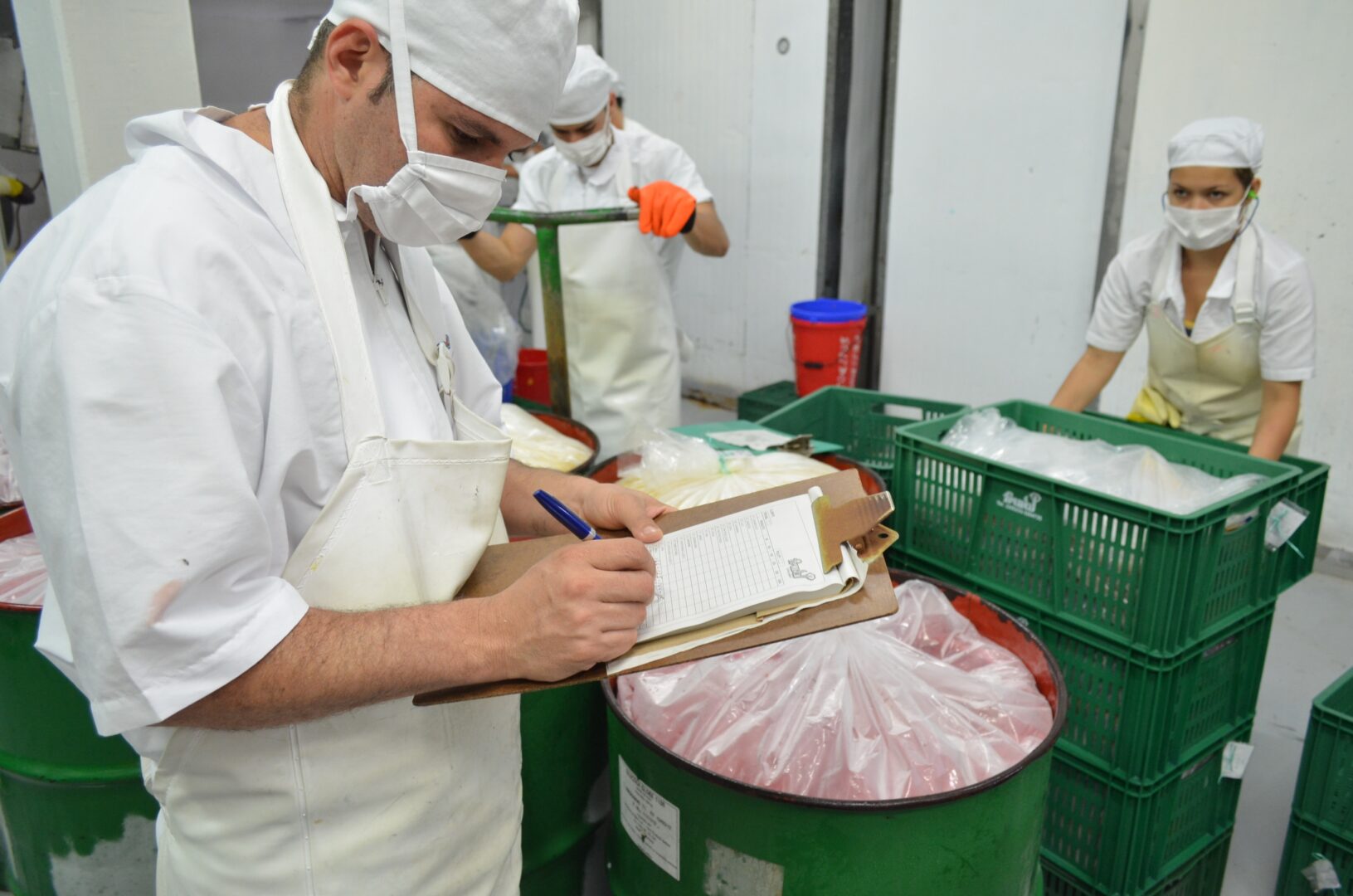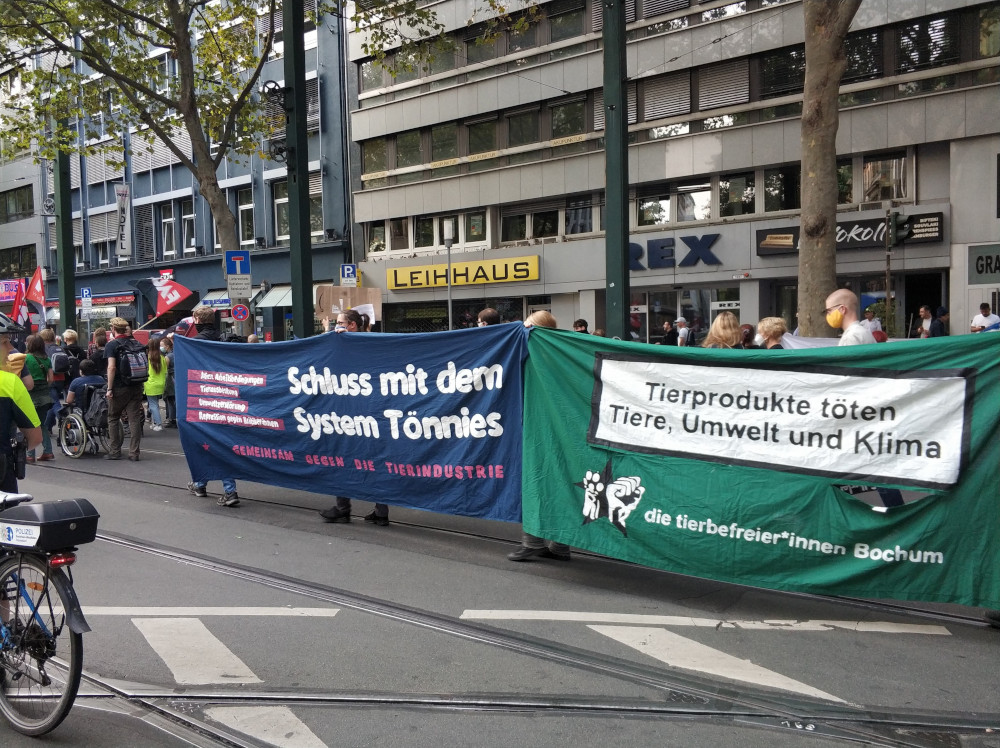The German meat industry has shown increasing growth figures at a huge pace over the past few decades, and Germany has become the fourth largest meat exporter in the world.1 And despite the fact that this country, with its comparatively small and populated areas, is in this respect “inferior” to traditional meat exporters such as Argentina, Brazil and the USA. Animal feed has to be imported in order to be able to keep livestock here on a large scale. Rainforests are cleared for cultivation, especially in Latin America (e.g. Brazil). The local meat industry can compete with locations in the large countries, which are in fact superior, for two reasons: high concentration of businesses and extreme exploitation of the people who work there. Most of them are not employed directly by the slaughterhouse operators but rather through work contracts with a subcontractor. Workers from Romania, Bulgaria and Poland are particularly affected. In the large slaughterhouses, they account for up to 80 per cent of the workforce.2 The workers often slave away under high pressure, at low wages and have to live in cramped and dirty collective accommodation, for which they also have to pay an above-average rent.3 4 5
Work contracts instead of permanent employment
Work in the slaughterhouse is hard. There are hardly any German applicants for such back-breaking jobs. This is another reason why the businesses are dependent on foreign workers. Tens of thousands of workers from Eastern and Southeastern Europe keep production running in Germany. In the past, it was mainly Poles who worked here; now it is people from Romania and Bulgaria. The reason is simple: they are even cheaper.

The corporations usually hire the workers through subcontractors, who then conclude so-called work contracts with them. This means that the purpose of exchange between empoyee and empoyer is not the working hours but rather the work performed. The subcontractors often have no more than one postbox.6 The workers in the meat industry are exploited to the maximum through these work contracts, which usually do not include social security. Although minimum wage also officially applies to them, it is often circumvented by excessive and unjustified deductions. There are illegal wage deductions for knives and work clothing. Fewer hours are paid than people actually work, than changing and commuting times and than the time people need to sharpen their knives. Even times when the assembly lines are shut down for technical reasons are often not paid. The minimum wage is also undermined by unpaid overtime and deductions due to alleged errors at work. It is also repeatedly reported that excessively long working hours and violations of safety rules are the order of the day.7 8 9
Therefore, while salaried jobs were being cut, more and more migrant workers from Romania, Bulgaria, Lithuania, Hungary and other countries from Eastern and Southeastern Europe slaved away under miserable conditions. According to estimates by the Food, Beverages and Catering Union (NGG), around 30,000 people are currently employed in the meat industry through work contracts. The animal industry and dubious recruitment companies make a huge amount of money at the expense of them.10
Even more difficult conditions
In addition, the subcontractors usually also arrange for the apartments; the empoyers usually don‘t want to play an part in it. Another trick of the subcontractors is to also rent out the accommodation. They charge excessive rents for the workers for collective accommodation, which sometimes has inhumane conditions. For a double room, 250 euros per person are quickly due, as observed by the NGG. This is a high price, since most of these “rooms” are collective accommodation: junk properties and shacks in which many people have to live in confined spaces.11
The workers are frequently vulnerable to the whims of the employer. The poverty in their home countries forces them to work in Germany, and their respective countries hardly have a lobby. Many of the colleagues are migrant workers who work here for a few months and then return to their countries. Part of the wages ensures the livelihood of their families. The workers are dependent on the money but find it difficult to defend themselves in a foreign country and often without knowledge of the German language. They are put under pressure and their passports are often confiscated. Anyone who does not play by the rules is replaced. Their poverty is shamelessly exploited. “In light of lacking alternative employment, migrant workers submit to the unlawful working and wage conditions, which are unfavourable and violate regulations. When the disciplinary power of the market is not enough, exploitative employers also deliberately use criminal means to make migrant workers compliant:
Workers are deliberately misinformed, threatened with wage deductions or dismissal and, in extreme cases, intimidated with threats or even the use of force. Migrant workers‘ lack of legal security and the ability to deal with conflict presents a considerable vulnerability, which is ruthlessly exploited by dubious employers…”12
Many promises but no changes
After the pressure on politics and the leading meat companies increased continuously, the NGG and representatives of the German meat industry announced in January 2014 that they would introduce a minimum wage of 7.75 euros gross per hour and gradually increase this to 8.75 euros. This also applies to workers from abroad who are employed by subcontractors in their home countries.13
In December 2015, 6 companies signed a voluntary commitment with which they promised, among other things, to obligate subcontractors to only employ workers in accordance with German labour and social security law. According to the food industry (VdEW), 18 companies have now joined the agreement. Less than a year later, however, the NGG criticised the Osnabrücker Zeitung because some promises had “in no way been kept”. NGG Vice President Claus-Harald Güster spoke of the fact that more than 50 per cent of workers in German slaughterhouses are still employed through work contracts.14
Several Corona outbreaks in German slaughterhouses in May 2020 sparked a public debate about health, infection and occupational safety in the meat industry. The sudden clear words from the Ministry of Labour are surprising, as the SPD has always been consistently behind the animal industry: “We as a society must no longer watch how people from Central and Eastern Europe are being exploited in this society”, said Labour Minister Hubertus Heil (SPD). The subcontracting in the meat industry is the “root of the evil”. Heil said: “We will improve these conditions.”15
In this light, the federal government presented a set of measures entitled
“Occupational Safety Programme for the Meat Industry”. The programme includes the abolition of work contracts in the animal industry by 2021. Artisanal enterprises such as slaughterhouses or butchers are excluded.16
Considering the measures taken to date, the programme is astonishingly specific and extensive. However, it should not be given too much attention, as the law has not yet been passed and no one knows how and whether it will ever be implemented. So far, legislative measures have mostly been averted through lobbying. The meat industry has still trampled on labour rights and has already announced massive opposition. Business and politics have always found solutions together to weaken laws, allow loopholes and circumvent laws. The animal industry is also known for denying responsibility and using illegal business practices when in doubt. Furthermore, the specific corona protection of precariously employed contract workers has still not been clarified.
The effects of the Corona crisis on workers
The German meat companies care little about the situation of their workers. The main thing is that there is enough cheap and willing labour and that profits are flowing. However, entry restrictions due to Corona posed the first hurdle. The flow of human resources suddenly threatened to fail. But Federal Agriculture Minister Julia Klöckner and the federal government solved one problem quickly: the Corona regulations for workers from Eastern Europe were quickly relaxed so that they could enter the country and the economy could continue to exploit them without any problems.17
As in almost every social crisis, the Corona crisis primarily affects the people who are at the bottom of this society such as migrant workers in the slaughterhouses and cutting plants of the meat industry. The exploitative working conditions makes it difficult for them to protect themselves from the virus. Accordingly, Corona broke out among the workers and once again revealed the dark side of the meat industry as well as the capitalist system. Appeals from trade unions and labour law initiatives, which called for measures to be taken to protect migrant workers from Corona infections, were ignored, and it came as expected: in slaughter factories, including Vion (around 5.1 billion euros turnover in 2019), Westfleisch (2.79 billion euros in turnover), Müller-Fleisch (500 million euros turnover) and PHW/Wiesenhof (2.69 billion euros turnover in the financial year 2018/19), thousands of workers have already been infected with Corona.
A lack of protective equipment, which is not only denied to them during the Corona period, non-compliance with social distancing regulations and heavy work that is harmful to health with 12-hour shifts 6 days a week all exhausts the employees and makes them particularly vulnerable. “The masks, which are determined according to the hygiene standards, serve primarily as protection against spit”, says Freddy Adjan, Vice Chairman of NGG. It has not been adequately checked whether they provide sufficient protection against viruses. The high physical strain on the workers on the slaughter line weakens immune resistance.18
They are also at an increased risk of infection in the cramped living quarters and the overcrowded vans that take them to work. “The reality is still overcrowded collective accommodation and transport to work in cramped vans and buses”, says Guido Grüner from ALSO e. V. Oldenburg.19 Due to mold in poor accommodation, some workers have respiratory diseases and are – especially with regard to a Corona infection – already burdened.
“The way people are accommodated in the Müller Fleisch case is scandalous”, said Freddy Adjan from taz.20 Many apartments are too small. The residents can often only cook food in difficult conditions. And usually, the crampedness, too few sanitary rooms, poor hygiene and the physical strain on workers in the meat industry promote diseases for which the body’s own defense is crucial. “We have been familiar with escalating viral diseases among foreign workers in meat companies for a long time. Last year, it was a hepatitis infection in Emsland”, says Adjan.21 Even before the Corona crisis, many of the workers were afraid of taking any sick leave whatsoever, as there was a threat of losing wages and jobs. This fear is intensifying with the current crisis. The question is who will pay if they now go into quarantine. From a purely legal point of view, the subcontractors would have to do this – trust is de facto.
The workers are of course very scared. As long as the appropriate protective measures are not met, further outbreaks are expected. According to the authorities, the corporations have the situation under control and the slaughtering can continue for the profit of a few. Action was only taken after a public outcry and slaughterhouses temporarily closed where there was no other option. However, the industry criticises this approach of the authorities, trivialises the appalling conditions as “residual risk”22 and, in their racist world view, even sees the employees themselves responsible for the Corona outbreaks: the Romanians are a sociable people; there is a lot of celebration, as Stefan Müller, Managing Director of Müller Fleisch, points out in all seriousness. Incidentally, Müller Fleisch also refuses to contribute financially towards quarantine measures.23
But it is not only the German meat industry that offers the ideal breeding ground for the Corona virus to spread: there are also more and more international reports of rapidly rising numbers of infections in slaughterhouses.24
Subsidies continue to flow in spite of everything
At the same time, corporations in the animal industry are classified as systemically relevant, although there would still be enough food supplies without them. Furthermore, they also profit from additional government measures – the industry is already heavily subsidised. Since the beginning of the 2000s, the government has specifically promoted industrial animal farming and the export of meat, dairy and live animals as part of subsidised, intensive animal farming. In addition, slaughterhouses were exempt from parts of the EEG reallocation charges and network charges.25 The slaugherhouses are of course not charged for the destruction of the environment and other negative effects of industrial meat production.
Since the EU launched a Corona stimulus package for the animal industry in April, some member states are now calling for further funds. While the first stimulus package was limited to dairy and certain meat products (beef, lamb and goat meat)26, the market for pork, veal and poultry meat is now to be supported by subsidies for private storage.27 All of this is happening while a broad social debate is sparking off about the miserable conditions of workers in the animal industry. Immediate measures to protect workers and money for structural change away from the animal industry are now needed instead of market support.
Something has to change – a system change is necessary
The political will to change something does not seem to be very great. The fact that the current ruling parties made this whole system possible with their precarious employment laws is all too often forgotten in current debate. Due to Corona, however, there is suddenly a massive media response.

The corporations are in the spotlight and their schemes are being brought to the attention of the public. They are now trying by all means to limit the damage in order to somehow achieve their only goal: the accumulation of profits. All of this shows once again that in this system, the lives and needs of both humans and animals are entirely subordinate to profit maximisation. Fundamental changes towards an economy that benefits people and is free from exploitation can only be achieved through a system change.
Definition of terms:
Work contract and temporary work:
In a work contract, a employer (company) places orders for clearly defined “work” to external companies. Invoicing is results-based and not according to working hours. The characteristic of a work contract is that the contractor creates this work (product) with their own labour, is liable for this work and determines by themself how it is created. This means that they are solely responsible for the deployment of those they employ. When a work contract exists, it is regulated in the general form of § 631 of the German Civil Code (BGB). Temporary work (labour leasing) occurs when a hiring company transfers employees to a company that employs them according to its own operational requirements. As with the work contract, the employment relationship exists with the external company from which the temporary workers also receive their wages. Unlike contract employees, however, they mainly receive their work instructions from employees of the company to which they are referred. In principle, temporary workers have the same rights as other employees – but the reality is often different. In addition, temporary workers usually earn significantly less than permanent colleagues even though they do the same work.
Source: “Few rights, low wages – How companies use work contracts”, a
brochure by the Food, Beverages and. Catering. Union (NGG)
1 https://llh.hessen.de/unternehmen/marktinformation/markt-aktuell/deutschland-der-viertgroesste-fleischexporteur/
2 https://taz.de/Corona-in-Baden-Wuerttemberg/!5680232/
3 https://taz.de/Archiv-Suche/!5689950&SuchRahmen=Print/
4 https://www.rnd.de/wirtschaft/tonnies-arbeitsbedingungen-von-werkvertragsarbeitern-200-stunden-fur-1200-euro-NEQENI2JN7YQGPYVAX243ETUSI.html
5 https://www.mdr.de/nachrichten/osteuropa/politik/fleischindustrie-arbeiter-osteuropa-ausbeutung-100.html
6 https://www.msn.com/de-de/finanzen/top-stories/gewerkschaft-fordert-rasches-verbot-von-werkvertr%C3%A4gen-in-fleischbranche/ar-BB15DeGI
7 https://taz.de/Archiv-Suche/!5689950&SuchRahmen=Print/
8 https://www.rnd.de/wirtschaft/tonnies-arbeitsbedingungen-von-werkvertragsarbeitern-200-stunden-fur-1200-euro-NEQENI2JN7YQGPYVAX243ETUSI.html
9 https://www.mdr.de/nachrichten/osteuropa/politik/fleischindustrie-arbeiter-osteuropa-ausbeutung-100.html
10 https://www.hz.de/politik/heil-mahnt-zur-eile-46351784.html
11 https://taz.de/Missstaende-in-der-Fleischindustrie/!5681763/
12 https://www.labournet.de/interventionen/asyl/arbeitsmigration/migrationsarbeit/schattenblick-schwerpunkt-grossschlachtung-werkvertraege-und-profite/
13 https://www.ngg.net/im-betrieb/branchen/fleisch/tarifinfos/
14 https://www.noz.de/deutschland-welt/wirtschaft/artikel/769300/nach-selbstverpflichtung-werden-schlachter-besser-behandelt-1
15 https://www.tagesschau.de/wirtschaft/heil-fleischindustrie-101.html
16 https://www.bmas.de/SharedDocs/Downloads/DE/PDF-Pressemitteilungen/2020/eckpunkte-arbeitsschutzprogramm-fleischwirtschaft.pdf?__blob=publicationFile&v=3
17 https://www.ndr.de/nachrichten/niedersachsen/Trotz-Corona-Erste-Erntehelfer-treffen-
ein,erntehelfer196.html18 https://www.ngg.net/pressemitteilungen/2020/coronavirus-infektion-bei-mueller-fleisch-landrat-und-gesundheitsamt-handeln-unverantwortlich/
19 https://www.also-zentrum.de/archiv/beitrag/breites-b%C3%BCndnis-fordert-sofortige-schutzma%C3%9Fnahmen-f%C3%BCr-arbeitsmigranten.html
20 https://taz.de/Corona-in-Baden-Wuerttemberg/!5680232/
21 https://www.noz.de/deutschland-welt/niedersachsen/artikel/1610333/tuberkulose-in-schlachthof-auch-faelle-im-landkreis-osnabrueck
22 https://www.focus.de/regional/nordrhein-westfalen/gesundheit-toennies-branche-nicht-unter-generalverdacht-stellen_id_11970880.html
23 https://aktuelle-sozialpolitik.de/2020/05/02/corona-infektionen-und-ein-staatsversagen-beim-arbeitsschutz/
24 https://www.theguardian.com/environment/2020/may/11/chaotic-and-crazy-meat-plants-around-the-world-struggle-with-virus-outbreaks
26 https://www.fleischwirtschaft.de/politik/nachrichten/Corona-Krise-Stuetzung-fuer-den-
Fleischmarkt-41832?crefresh=1
27 https://www.topagrar.com/management-und-politik/news/kloeckner-konjunkturschub-fuer-stallbau-und-wald-ist-starkes-signal-12079055.html
